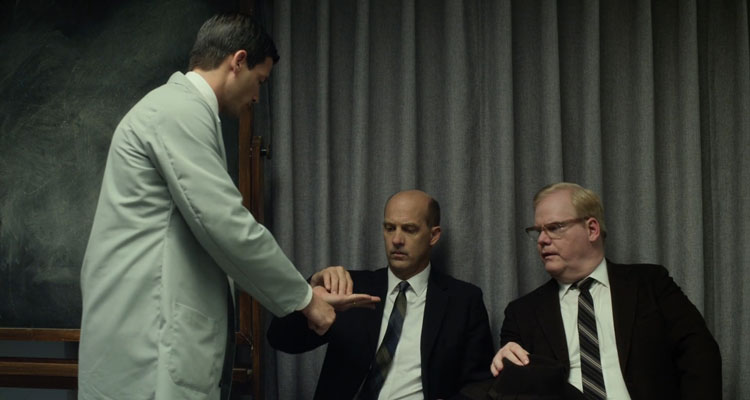Before I checked out Experimenter, the only thing I knew about it was the fact that it’s based on true events. Also I must admit that I wasn’t aware of the radical experiments that Stanley Milgram conducted in the sixties. This is perhaps the reason why I was so impacted by the beginning of the movie and so disappointed with the rest of it. Now, after a few days, I was able to collect my thoughts into this review.
If all this is a bit ominous sounding, it should be because this movie raises some important questions. Questions that we, as a human race, seem to not wanna know answers to. The movie itself was a bit too conceptual for me. The constant shifts between past and present, the uneven pace and strange atmosphere dampened the Milgrims’ scream.
However the issue is so important that all these flaws seem small and insignificant. It reminded me of a couple of movies that explored similar issues like A Dangerous Method and The Experiment. Movies about psychology are so rare. I mean real movies about psychology, not the ones where it’s just another gimmick. If you’re looking for similar movies check out Kinsey from 2004.
Meet Stanley Milgram, an American social psychologist working on his new theory about the obedience. Struggling to grasp the level of horrors committed during WWII, he decides to focus on obedience. Soon, Stanley will devise an experiment in an effort to better understand this human trait. An experiment that will change the world.
At the core of Experimenter is the Milgram’s research about obedience and subsequent results. We will learn more about his other work and life, but the focus will remain firmly on this one thing. And for a good reason too. Peter Sarsgaard is one of those actors you just don’t notice in movies. Here, however, he was fantastic and the same goes for the rest of the cast. His subdued performance was totally in service of the story.
And I did the same. With a topic as this one, I bet you were expecting this huge rant about the system of values. There won’t be one. I want to leave all that open for your own analysis. Try to apply things you learned here to your environment. See how people around you behave. Think about what would they do in the experiment.

Now, we need to talk about the way director Almereyda approached this project. I respect his artistic vision that somewhat suited the story but I can’t help but wonder was this the right choice. Experimenter also breaks the so called fourth wall. This means that Milgram will talk to the audience from time to time. If he went for the more usual and familiar approach, could the story been told in much more effective way? I fear that the average viewer will be put off with this rather dry and clunky approach. And I so need the average viewer to see this movie. That, however, is all in the past. And at least this didn’t turn out to be disaster like his last movie Cymbeline.
Professor Milgram elaborated two theories:
- The first is the theory of conformism, based on Solomon Asch conformity experiments, describing the fundamental relationship between the group of reference and the individual person. A subject who has neither ability nor expertise to make decisions, especially in a crisis, will leave decision making to the group and its hierarchy. The group is the person’s behavioral model.
- The second is the agentic state theory. Milgram elaborates: “the essence of obedience consists in the fact that a person comes to view themselves as the instrument for carrying out another person’s wishes, and they therefore no longer see themselves as responsible for their actions. Once this critical shift of viewpoint has occurred in the person, all of the essential features of obedience follow”

Director: Michael Almereyda
Writer: Michael Almereyda
Cast: Peter Sarsgaard, John Leguizamo, Winona Ryder, Anton Yelchin, Dennis Haysbert, Josh Hamilton, Jim Gaffigan
True Events: Milgram experiment
Fun Facts: Although Almereyda was aware of Milgram’s work, he wasn’t planning a movie about it. When his girlfriend began taking a class about his work, he slowly became more and more intersted. Finally, after reading one of his books, he realized how filmable it is and things went from there. The book was Obedience to Authority: An Experimental View.
Rating:
IMDb Link: http://www.imdb.com/title/tt3726704/



